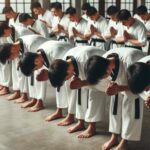Introduction:
Table of Contents
Kung Fu, an ancient Chinese martial art, is renowned for its intricate movements, fluid techniques, and philosophical underpinnings. Beyond its physical prowess, Kung Fu training offers a myriad of benefits, one of which is the improvement of neuromuscular coordination. In this article, we delve into the fascinating ways in which Kung Fu training Boosts neuromuscular coordination and enhances this essential aspect of human performance.

Understanding Neuromuscular Coordination
Neuromuscular coordination refers to the harmonious interaction between the nervous system and muscles, enabling precise and efficient movement execution. It involves the integration of sensory information, processing within the brain, and motor output to achieve desired actions.
Kung Fu Training Boosts Neuromuscular Coordination
Kung Fu training emphasizes the cultivation of mind-body connection, a fundamental aspect of neuromuscular coordination. Through rigorous practice, practitioners develop heightened awareness of body mechanics, balance, and spatial orientation.
Techniques Employed in Kung Fu Training
Various techniques in Kung Fu training target neuromuscular coordination directly. Forms practice, involving sequences of choreographed movements, enhances coordination by promoting fluid transitions between stances, strikes, and blocks.
Neuroplasticity and Adaptation
Kung Fu training induces neuroplastic changes in the brain, facilitating the development of new neural pathways and refining existing ones. This neuroplasticity allows practitioners to adapt and improve their coordination over time.
Benefits Beyond Physical Coordination
Beyond improving physical coordination, Kung Fu training fosters mental clarity, focus, and discipline. These cognitive enhancements contribute to overall neuromuscular coordination by optimizing attentional control and reaction times.
Incorporating Kung Fu Principles into Everyday Life
The principles instilled through Kung Fu training extend beyond the training hall, influencing how practitioners navigate daily challenges. By applying concepts such as mindfulness, adaptability, and perseverance, individuals can enhance their neuromuscular coordination in various contexts.

Empowerment Through Kung Fu
In conclusion, Kung Fu training boosts neuromuscular coordination. Kung Fu training offers a holistic approach to improving neuromuscular coordination, blending physical, mental, and philosophical elements. By embracing the discipline and dedication required, practitioners unlock their full potential and achieve mastery over mind and body.
Information-Based TableKung Fu Training Boosts Neuromuscular Coordination:
| Technique | Description |
|---|---|
| Forms Practice | Sequences of movements designed to enhance coordination and fluidity. |
| Chi Sau (Sticky Hands) | Partner exercise focusing on sensitivity, reflexes, and spatial awareness. |
| San Shou (Sparring) | Controlled combat drills that require rapid decision-making and adaptation. |
| Qigong | Breathwork and meditation techniques to promote relaxation and focus. |
Conclusion:
Kung Fu training serves as a powerful catalyst for enhancing neuromuscular coordination, offering a blend of physical, mental, and philosophical benefits. Through dedicated practice and adherence to Kung Fu principles, individuals can unlock their full potential and cultivate mastery over mind and body. Embrace the journey of Kung Fu, and experience the transformational effects it brings to your life.
FAQs:
- How often should I practice Kung Fu to see improvements in neuromuscular coordination?
- Consistency is key. Aim for regular practice sessions, ideally several times per week, to experience noticeable enhancements.
- Can anyone benefit from Kung Fu training, regardless of age or fitness level?
- Absolutely. Kung Fu is adaptable to individuals of all ages and fitness levels, with instructors tailoring training programs accordingly.
- Are there specific Kung Fu styles more suited for improving neuromuscular coordination?
- While all Kung Fu styles emphasize coordination, some, such as Wing Chun or Tai Chi, may place greater emphasis on slow, controlled movements conducive to coordination refinement.
- Is neuromuscular coordination the only benefit of Kung Fu training?
- No, Kung Fu training offers a multitude of benefits, including physical fitness, mental resilience, and self-defense skills, among others.
- How long does it take to notice improvements in neuromuscular coordination through Kung Fu training?
- Results vary depending on individual factors such as dedication, starting fitness level, and the intensity of training. However, many practitioners report experiencing tangible improvements within a few months of consistent practice.


